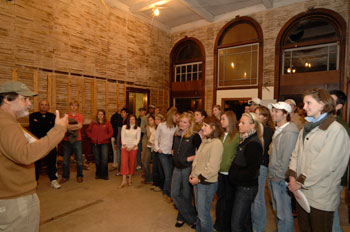 | spartanburg business & community directory |
|
This is an archived page that may contain outdated or incorrect information. Please visit www.Spartanburg.com for the latest news, events, and more.
 Wofford College has acquired three acres along the Lawson�s Fork Creek in Glendale for the creation of a new environmental studies program, and the college has begun the process of renovating for classrooms, labs and offices the old Glendale Mill office building.
Wofford College has acquired three acres along the Lawson�s Fork Creek in Glendale for the creation of a new environmental studies program, and the college has begun the process of renovating for classrooms, labs and offices the old Glendale Mill office building.
Glendale, situated along the Lawson�s Fork Creek in eastern Spartanburg County, has been the scene of plenty of history over the past 250 years � from stopover on the Cherokee Trail to a Revolutionary War iron works to a 20th century textile manufacturing center. Now, the cotton mill buildings are gone, but thanks to Wofford and several key partners, the area looks forward to a bright new future as an environmental education center. The acquisition and planned development represent a tremendous step forward for both Wofford and Spartanburg. For the college, Glendale will be its first permanent educational facility not on Wofford�s historic downtown campus. As English professor John Lane puts it, �Glendale gives us a field station where we can take our students off our traditional urban campus and into one of Spartanburg County�s nearby mill communities. From that vantage point, students will have on-the-ground, real-time interactions with nature and culture issues they read about in class.� Those issues will be of an interdisciplinary nature, says Lane, who is heading up a faculty task force to make proposals for a new major and minor in environmental studies. He sees a wealth of academic possibilities at Glendale � from scientific exploration of water quality in Lawson�s Fork Creek to creative writing projects about nature, from physical education courses on kayaking to up-close historical study of the South�s textile heritage. �This is the first time we will have a designated field site, and as an urban campus that�s extremely important,� says biology professor Ellen Goldey, who has taken a lead role in Wofford�s application for a $1.6 million grant from the Howard Hughes Medical Institute. The funding would be put toward the development of academic and outreach programs. �We see the potential for doing research ranging from toxicology � in biology and chemistry courses � to natural history surveys of flora and fauna. It�s a rich site. It�s a beautiful site. Students will love it,� Goldey says. She and Lane are also excited about prospects for collaborations � including service learning � with local school districts. In all, says President Benjamin B. Dunlap, �The Glendale environmental studies project represents Wofford�s commitment to the �green� movement in general and to the environment in South Carolina in particular.� Glendale, meanwhile, is one of Spartanburg County�s most significant historical sites. �The watershed of Lawson�s Fork Creek in Spartanburg County has gone through at least four transitions in its economy and culture since Europeans first came to the area around 1750. You can experience all four at Glendale,� says Doyle Boggs, Wofford�s executive director of communications and a published Spartanburg historian. Boggs points to farming and trading along waterways during the 1700s, early iron and textile manufacturing activities, the rise of large-scale textile mills and villages, and the recent decline of the local textile industry � all are part of Glendale�s history. �The late Dr. Lewis Jones always used to tell his Wofford students that �it happened� is a good phrase for history teachers, but that �it happened right here� is even better. Seeing and touching make history real. This is what makes Glendale a special place,� Boggs says. B.G. Stephens, professor emeritus and former dean of the college, is brimming with excitement these days over the project. �Sometimes I wake up in the morning and think, �This can�t be happening. I must have dreamed this. It�s just too good.�� Stephens grew up in the Glendale community and recently has been at the center of a host of efforts to revitalize the historic textile mill village. He has worked not only with Wofford�s project there, but also other developments that he believes paved the way for the college. Glendale United Methodist Church, where Stephens� family attended when he was a youngster, closed several years ago. Rather than selling the property to a private investor, Stephens helped the church win a planning grant from the Mary Black Foundation that led to the purchase of the church by the Palmetto Conservation Foundation (PCF). The PCF-run Glendale Outdoor Leadership School is now housed in the old church. These activities put the spotlight on Glendale as an exciting historical location for redevelopment, and discussions were started between PCF, Stephens and Glynn Morris, who owned a large strip of land along Lawson�s Fork Creek in and around the site of the old mill. Morris donated a number of acres in the floodplain to PCF and was interested in seeing the mill office become a �gateway� for potential development on the remaining property, Stephens says. After months of discussion, Morris donated the office building and three acres to Wofford. For Stephens, Wofford�s move into his old neighborhood �is like manna from heaven.� Donnie Love, of Spartanburg-based architects McMillan Smith & Partners, PLLC, is designing floor plans for the mill office building. Love specializes in historic structures and oversaw the award-winning renovation of Wofford�s Old Main. Plans are for the mill building to be open by January 2009. (Images provided by Wofford College.)
|
